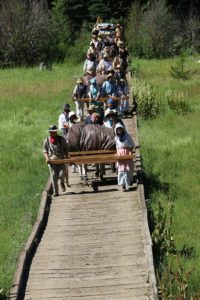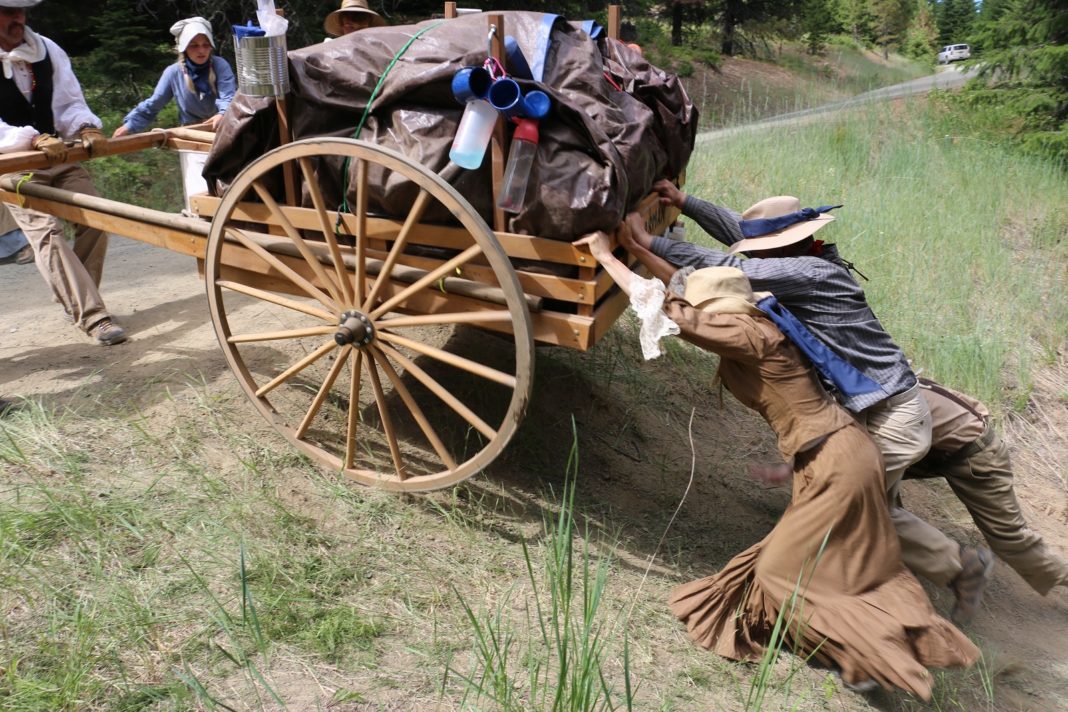Submitted by Kathryn R. Bates
Anyone who’s done a road trip this summer has done so in style! At least compared to road trips of the past with no AC, nor an I-pad to entertain the little ones. It was quite a different time without seat belts in the over packed car, and all the windows rolled down to catch a breeze. Yes, the key word being “rolled” down….no touch of a button to get that window open. Using paper maps wide open trying to locate where we were.

That was comfortable. At least compared to how our ancestors did road trips in the 1840’s and ’50’s. Our ancestors rode in covered wagons and pushed and pulled their way west using hand carts. No AC, no fast food breaks, not even a port-a-potty. They traveled on, relying on courage, unity, sacrifice and faith.
Over 200 people just experienced this for themselves. These folks reenacted the Mormon pioneer’s move west this past July 10 – 13. The company consisted of 149 teenagers ages 14 – 18, and a brave volunteer crew of adults who went along as Trail Boss and Company Captains, as well as a Medical Team, and Cooks. The Olympia Stake of the Church of Jesus Christ of Latter Day Saints, which consists of church members throughout Olympia and Tumwater, spent close to two years planning and preparing for this momentous and strenuous activity to help the youth relate to what the Mormon pioneers endured. The event took place at Gnats Flats, in the Cascades. Handcarts had been previously built, and the teens showed up in traditional pioneer garb, leaving behind cell phones, cameras, watches, make up, and other commonly used items by teens. They came ready to hit the dusty trails in boots, long skirts, bonnets, cowboy hats, and suspenders. You’d think teenagers would shun such an activity, but the kids came out in larger numbers than expected. One of the girls said, “It’s something I’ve been looking forward to for a long time.”
Upon arriving, the youth were divided into families, led by a volunteer couple they referred to as “Ma and Pa”. The Trail Boss, Greg Rightmier, who in his daily life is a firefighter, told the kids before they even started, “You’re going to have hard trials. It’s going to be hard on you.” But youth of all statures and abilities took on the challenge.
After loading their carts weighing between 400-500 pounds, the trek began with each family pushing and pulling their way up and down a difficult trail. At night they would gather in the meadow to set up their tents. After a hard day of physical challenges, the evenings were welcome for enjoying some true pioneer unity with folk dances and visiting, as well as singing and reflection time writing in journals. But when the sun set, it was time to hunker down and get some sleep, knowing that the next day would ask even more of them physically.
Norman Mitchell, President of the Olympia Washington Stake said, “The strengths and the virtues of the pioneers, I think we share that today. Faith, sacrifice, unity, those are virtues … that are timeless.”
McKynlee Blatter, a senior at Black Hills High School said, “You learn more by actually doing it.” These youth will never hear another pioneer story quite the same. They have walked, literally, in the pioneer’s shoes.
Eric Engen, a CRNA and one of the Pa’s said, “The next time they hear these stories about pioneers, it’s going to mean something to them. This changed their entire outlook.”
The hardest part of the trek came when they faced a grueling long, upward climb. After enduring their way to the top, many youth were touched by the struggles of those below, and ran back down to help the next family. One boy was overheard saying, “Helping others is helping Christ.” This was demonstrated over and over as the youth helped one another in every situation. Braden Pierson, a recent graduate of Capitol High School said, “It was pretty awesome seeing everyone work together.”
During the grueling heat, they would find “trading posts” along the trail, manned by a costumed Union Soldier, or a Native American (Dan Olson), who would sell or trade food and supplies. On the final day of the trek, a Fair was held which included leather working, hatchet throwing, potato sack races, and black powder rifle shooting.
After 4 days and 25 miles of rock-strewn trails, it was a sweaty, dirty and frankly, a smelly group that arrived at the base camp, greeted by well-wishers. They had blisters and mosquito bites. They had well-worn shoes and torn skirts. But they were smiling!
“One thing I noticed is I had a lot more conversations with people face to face especially since we were all unplugged from our devices,” said Braden. Although this is one positive outcome, Ma, Melanie Engen summed up a common theme when she said, “We learned that we can do hard things.”
Olympia businessman and Company Captain Reid Bates, added, “That sense of unity; literal brotherhood and sisterhood, was really exhibited this week.”
Why would 149 youth from our area do such a thing? Local Orthodontist and Company Captain Steven Alexander said, “It helps history to be more real. It helps to tie them to their heritage.”
Norman Mitchell added, “Think about what legacy you’ll leave behind for those who come after you. We have trek to build faith in Christ.”
Would our ancestor pioneers think our air conditioned cars are a wimpy way to travel? Probably. But these youth learned that you can sacrifice, and work together as a family in our day, too. You can do hard things.




























































